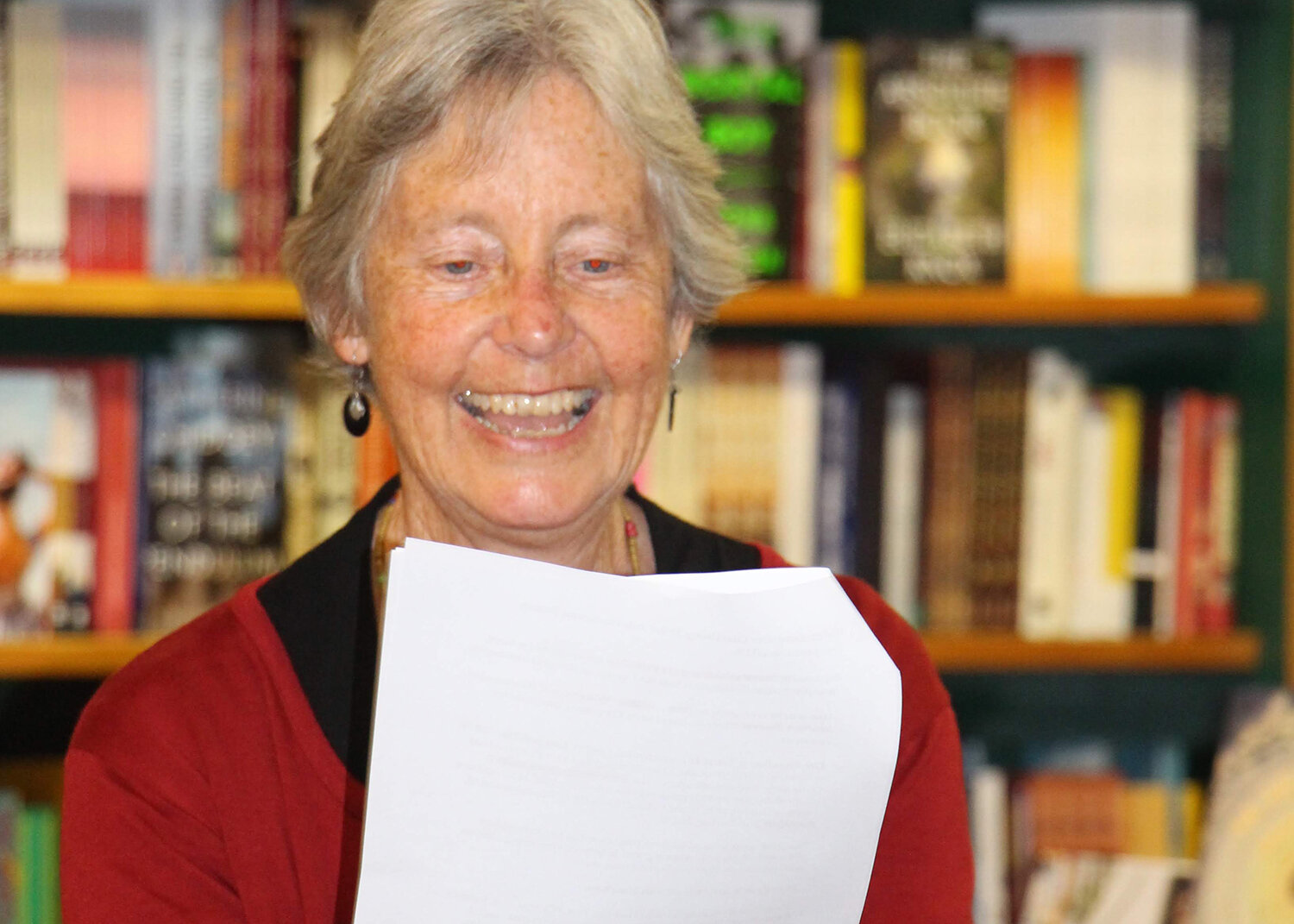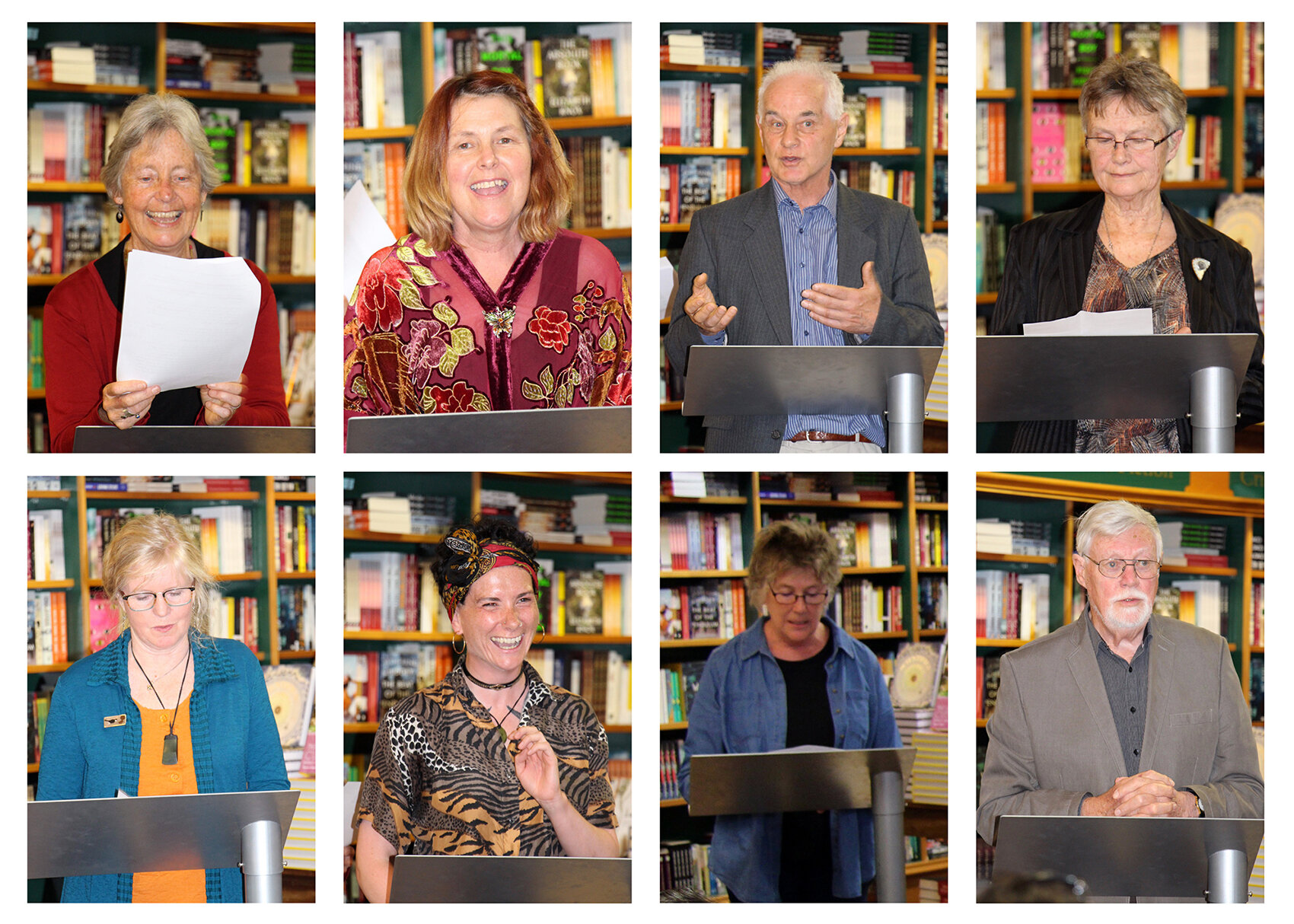The 2019 Poetry Awards Judges Report
Poet Dinah Hawken reads her Judges Report on the Awards Night at the University Bookshop, Tuesday 26 November 2019.
The Caselberg’s International Poetry Prize Awards Night was held at the University Bookshop on Tuesday 26 November 2019 — this years guest judge was poet Dinah Hawken — following is her report…
Judge’s Report — Caselberg International Poetry Competition 2019
By Poet Dinah Hawken
To move from 200 poems through a longlist to a shortlist I began to develop a checklist. I began to see more clearly what - in my mind - makes an attractive, sustainable poem. But first I should say, as a poetry reader, I know I have subjective leanings and, although they are not on my checklist for a ‘good poem’, I’d like to make some of them clear.
I warm to a poem that makes an impact emotionally as well as an impact of ideas and description. I like poems that, in my serious mind, ‘really matter’ in this unsettled world, though I know what really matters is changeable, individual and wide ranging. I’m partial to poems that show a love of the natural world because, even with us in it, our landscape continues to be inspiring and generative. (I was glad to meet many poems amongst the entries that began in the landscape and had concerns about climate change.) I’m also interested in the psychological understanding some poems offer - as insight, fellow feeling or consolation. I think now of this short poem from the shortlist:
It hasn’t taken long
to feel tired of the world.
The crunch of snow
now given way to the
sharp edge of words.
Trying to hold them,
my will to melt them.
To hand them back
magnanimous
softer than they came.
Economy and insight can make a strong poem. And sometimes it is a single line that makes a personal impact, as in this one:
‘But up they go, the stems, or went, or will.’
That line will stay with me as a re-minder and a consolation for a long time.
To return to the top of the checklist, the first characteristic of a good poem must surely be a genuine love of language - in the many ways it can show itself. As Jane Hirshfield writes: ‘every good poem begins in language awake to its own connections – language that hears itself and what is around it …’. Most of the poems that missed my longlist were poems without such awareness, poems that used words for self-expression only. Some of those poems were moving and valuable as individual responses to their situations but without a love of language, and its infinite sounds and possibilities, the poet is like an artist who doesn’t care much about her materials. Language in a poem doesn’t need to be flamboyant or ‘poetic’ but an essential consideration. A language-awake poem can be as simple as the choice of a single surprising adjective as in this poem from the shortlist (that I think may have been written by a young person) about a cat called Henry:
I sometimes wonder
where do you go Henry
when the people all leave
and you are all alone
with that undecided smile.
The second characteristic on my checklist is distinctiveness. I asked of each poem: have I heard you, or a poem like you, too often before? Originality and imagination, also on my list, differ I think from a distinctive voice in a poem. The ablility to be original and/or imaginative seems an innate creative quality, difficult to cultivate, perhaps akin to talent? I know I wish I had more of it.
There is a process in the making of a poem I am calling sensitive observation: sensitivity to the experience, place, words that initiate a poem as well as sensitivity during the writing where more discoveries are made. The outer and inner perceptions intertwine. Attentiveness to both is central to a good poem and seems to produce a natural subtlety.
The shortlisted poems had very little awkwardness in their movements from line to line, and they had an ear for the poem’s rhythm, a rhythm that complemented the tone and feeling of the poem. However, even in the poems I’ve chosen I can sometimes hear a need for more careful crafting and greater clarity. (Do the two need each other?) I didn’t understand a number of the poems and I tried to distinguish lack of clarity from plain difficulty i.e. when the poet knows much more than you do and you need the internet and dictionary. Clarity is tricky when you also value mystery, drama and surprise in a poem, which I do, but clarity makes a strong connection with the reader, and is one of the items on my list as well.
So measuring the poems against the checklist - for love of language, distinctiveness, imagination, sensitive observation, musicality, craft, surprise, clarity and a respect for the reader - edged me towards final decisions. The choices have been hard and, despite the attempt to assess, will I’m sure also reflect my own preferences.
above from left: 1. Dinah Hawken reads her Judges Report 2. Gail Ingram reads her winning poem, The social-meadia cat got their tongues. 3. Runner-up David Shulz reads the fungibility of thought. HIGHLY COMMENDED: 4. Carolyn McCurdie reads Dog written by Mary Macpherson. below from left: 5. Claire Beynon reads R channels David Attenborough also written by Mary Macpherson. 6. Emer Lyons reads her poem, Somebody killed the cat. 7. Pam Morrison reads Second Language written by Ruby Solly. 8. Alan Roddick reads his poem, Catch and Release. [Tuesday 26 November 2019 at the University Bookshop]

